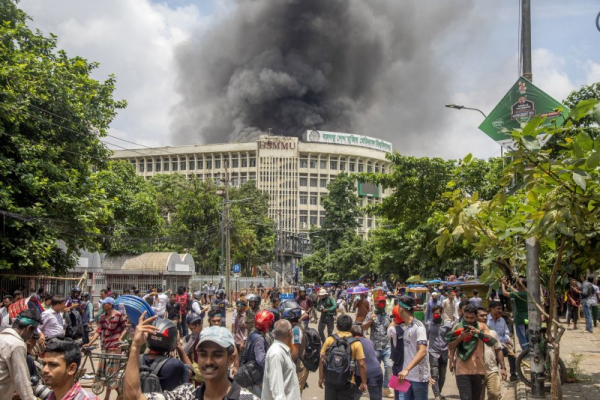
Black smoke rises from Dhaka University’s Bangabandhu Sheikh Mujib Medical Center on Sunday amid clashes between demonstrators and supporters of the ruling Awami League on day one of a civil non-cooperation movement aimed at ramping up pressure on the government. The Anti-Discrimination Student Movement organizers’ demand for the government to stand down was met less than 24 hours later when Prime Minister Sheikh Hasina quit and fled the country. Photo by Monirul Alam/EPA-EFE
Bangladesh’s embattled prime minister, Sheikh Hasina, resigned Monday and fled the country after protesters stormed her official residence in the capital amid a growing revolt that began over quotas for government jobs in which hundreds of mostly protesters have died.
The announcement from the head of the army, Gen. Waker-uz-Zaman, came after security forces were overwhelmed by thousands of people incensed by a violent government crackdown descending on the Sher-e-Bangla Nagar area of Dhaka, setting cars and offices ablaze. Advertisement
Footage circulating online shows protesters celebrating inside Hasina’s residence, removing furniture and elsewhere in the city trying to tear down a statue of her father, Sheikh Mujibur Rahman, former prime minister and leader of the country’s independence movement, who was assassinated in 1975.
Promising the formation of an interim government, Zaman pleaded with demonstrators to call off their protests. Advertisement
“Whatever demands you have, we will fulfil and bring back peace to the nation, please help us in this, stay away from violence,” said Zaman who promised the military would also back off.
“The military will not fire at anyone, the police will not fire at anyone, I have given orders.”
Hasina arrived by helicopter in India at a military airbase 17 miles east of Delhi on Monday evening with the BBC reporting that she may be en route to London, citing unconfirmed reports.
A spokesman for British Prime Minister Keir Starmer said Monday that he wanted to see urgent action to “ensure democracy” won out — but made no mention of Hasina coming to Britain or any discussions regarding where she might go into exile.
“The right to peaceful protest must be protected and never subjected to violence, and we call on the authorities to release all peaceful protesters and ensure due process is followed for those charged and prosecuted,” he added.
“I hope that swift action is taken to ensure that democracy prevails and accelerate the process towards peace and security to people in Bangladesh.”
Hasina’s son, Sajeeb Wazed Joy, said she had been considering resigning for the past 24 hours and had left the country for her own safety at the insistence of her family. Advertisement
He rejected the accusations leveled at the 76-year-old of outstaying her welcome after four terms totaling more than two decades during which she gradually morphed from the democratic icon catapulted into office in a people power uprising into an authoritarian leader amid crackdowns on dissent and allegations of graft.
“She has turned Bangladesh around. When she took over power it was considered a failing state. It was a poor country. Until today it was considered one of the rising tigers of Asia. She’s very disappointed.”
In Dhaka, demonstrators ignored an evening curfew as unrest and looting continued into the night with demonstrators breaching the gates and damaging the residence of Home Minister Asaduzzaman Khan in the Dhanmondi area of the capital where smoke was seen coming from the building.
Protesters torched the city’s Mujibur museum.
Northeast of Dhaka, 150 miles away in Sylhet, the offices of the deputy commissioner and superintendent of police and the homes of several councilors were attacked.
Hasina’s resignation came a day after more than 90 people were killed Sunday during clashes between anti-government protesters and police — 13 of whom were among those killed after thousands of people attacked a police station in the northwestern district of Sirajganj. Advertisement
Sunday’s casualties brought the death toll to 280 since early July when student protests over the partial reinstatement by the courts of civil service recruitment quotas — where sought-after government jobs were reserved for supporters of Hasina’s ruling Awami League — erupted into wider, and violent, anti-government unrest.
Government crackdown efforts escalated from tear gas and rubber bullets to live fire, curfews and Internet blackouts bringing hundreds of thousands more people onto the streets demanding change and ultimately Hasina’s resignation.
Student organizers had called Sunday for a national non-cooperation government boycott under which people would refuse to pay taxes and utility bills.